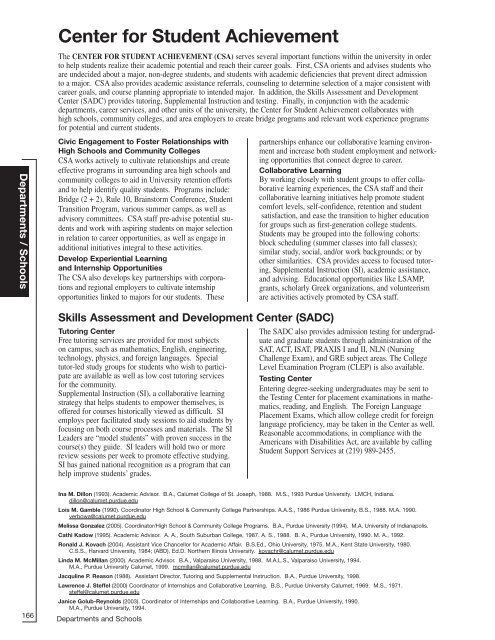ACADEMIC CATALOG - Purdue University Calumet
ACADEMIC CATALOG - Purdue University Calumet
ACADEMIC CATALOG - Purdue University Calumet
You also want an ePaper? Increase the reach of your titles
YUMPU automatically turns print PDFs into web optimized ePapers that Google loves.
Center for Student Achievement<br />
The CENTER FOR STUDENT ACHIEVEMENT (CSA) serves several important functions within the university in order<br />
to help students realize their academic potential and reach their career goals. First, CSA orients and advises students who<br />
are undecided about a major, non-degree students, and students with academic deficiencies that prevent direct admission<br />
to a major. CSA also provides academic assistance referrals, counseling to determine selection of a major consistent with<br />
career goals, and course planning appropriate to intended major. In addition, the Skills Assessment and Development<br />
Center (SADC) provides tutoring, Supplemental Instruction and testing. Finally, in conjunction with the academic<br />
departments, career services, and other units of the university, the Center for Student Achievement collaborates with<br />
high schools, community colleges, and area employers to create bridge programs and relevant work experience programs<br />
for potential and current students.<br />
Departments / Schools<br />
Civic Engagement to Foster Relationships with<br />
High Schools and Community Colleges<br />
CSA works actively to cultivate relationships and create<br />
effective programs in surrounding area high schools and<br />
community colleges to aid in <strong>University</strong> retention efforts<br />
and to help identify quality students. Programs include:<br />
Bridge (2 + 2), Rule 10, Brainstorm Conference, Student<br />
Transition Program, various summer camps, as well as<br />
advisory committees. CSA staff pre-advise potential students<br />
and work with aspiring students on major selection<br />
in relation to career opportunities, as well as engage in<br />
additional initiatives integral to these activities.<br />
Develop Experiential Learning<br />
and Internship Opportunities<br />
The CSA also develops key partnerships with corporations<br />
and regional employers to cultivate internship<br />
opportunities linked to majors for our students. These<br />
partnerships enhance our collaborative learning environment<br />
and increase both student employment and networking<br />
opportunities that connect degree to career.<br />
Collaborative Learning<br />
By working closely with student groups to offer collaborative<br />
learning experiences, the CSA staff and their<br />
collaborative learning initiatives help promote student<br />
comfort levels, self-confidence, retention and student<br />
satisfaction, and ease the transition to higher education<br />
for groups such as first-generation college students.<br />
Students may be grouped into the following cohorts:<br />
block scheduling (summer classes into fall classes);<br />
similar study, social, and/or work backgrounds; or by<br />
other similarities. CSA provides access to focused tutoring,<br />
Supplemental Instruction (SI), academic assistance,<br />
and advising. Educational opportunities like LSAMP,<br />
grants, scholarly Greek organizations, and volunteerism<br />
are activities actively promoted by CSA staff.<br />
Skills Assessment and Development Center (SADC)<br />
Tutoring Center<br />
Free tutoring services are provided for most subjects<br />
on campus, such as mathematics, English, engineering,<br />
technology, physics, and foreign languages. Special<br />
tutor-led study groups for students who wish to participate<br />
are available as well as low cost tutoring services<br />
for the community.<br />
Supplemental Instruction (SI), a collaborative learning<br />
strategy that helps students to empower themselves, is<br />
offered for courses historically viewed as difficult. SI<br />
employs peer facilitated study sessions to aid students by<br />
focusing on both course processes and materials. The SI<br />
Leaders are “model students” with proven success in the<br />
course(s) they guide. SI leaders will hold two or more<br />
review sessions per week to promote effective studying.<br />
SI has gained national recognition as a program that can<br />
help improve students’ grades.<br />
The SADC also provides admission testing for undergraduate<br />
and graduate students through administration of the<br />
SAT, ACT, ISAT, PRAXIS I and II, NLN (Nursing<br />
Challenge Exam), and GRE subject areas. The College<br />
Level Examination Program (CLEP) is also available.<br />
Testing Center<br />
Entering degree-seeking undergraduates may be sent to<br />
the Testing Center for placement examinations in mathematics,<br />
reading, and English. The Foreign Language<br />
Placement Exams, which allow college credit for foreign<br />
language proficiency, may be taken in the Center as well.<br />
Reasonable accommodations, in compliance with the<br />
Americans with Disabilities Act, are available by calling<br />
Student Support Services at (219) 989-2455.<br />
166<br />
Ina M. Dillon (1993). Academic Advisor. B.A., <strong>Calumet</strong> College of St. Joseph, 1988. M.S., 1993 <strong>Purdue</strong> <strong>University</strong>. LMCH, Indiana.<br />
dillon@calumet.purdue.edu<br />
Lois M. Gamble (1990). Coordinator High School & Community College Partnerships. A.A.S., 1986 <strong>Purdue</strong> <strong>University</strong>, B.S., 1988. M.A. 1990.<br />
verbowa@calumet.purdue.edu<br />
Melissa Gonzalez (2005). Coordinator/High School & Community College Programs. B.A., <strong>Purdue</strong> <strong>University</strong> (1994). M.A. <strong>University</strong> of Indianapolis.<br />
Cathi Kadow (1995). Academic Advisor. A. A., South Suburban College, 1987. A. S., 1988. B. A., <strong>Purdue</strong> <strong>University</strong>, 1990. M. A., 1992.<br />
Ronald J. Kovach (2004). Assistant Vice Chancellor for Academic Affair. B.S.Ed., Ohio <strong>University</strong>, 1975. M.A., Kent State <strong>University</strong>, 1980.<br />
C.S.S., Harvard <strong>University</strong>, 1984; (ABD), Ed.D. Northern Illinois <strong>University</strong>. kovachr@calumet.purdue.edu<br />
Linda M. McMillan (2000). Academic Advisor. B.A., Valparaiso <strong>University</strong>, 1988. M.A.L.S., Valparaiso <strong>University</strong>, 1994.<br />
M.A., <strong>Purdue</strong> <strong>University</strong> <strong>Calumet</strong>, 1999. mcmillan@calumet.purdue.edu<br />
Jacquline P. Reason (1988). Assistant Director, Tutoring and Supplemental Instruction. B.A., <strong>Purdue</strong> <strong>University</strong>, 1998.<br />
Lawrence J. Steffel (2000) Coordinator of Internships and Collaborative Learning. B.S., <strong>Purdue</strong> <strong>University</strong> <strong>Calumet</strong>, 1969. M.S., 1971.<br />
steffel@calumet.purdue.edu<br />
Janice Golub-Reynolds (2003). Coordinator of Internships and Collaborative Learning. B.A., <strong>Purdue</strong> <strong>University</strong>, 1990.<br />
M.A., <strong>Purdue</strong> <strong>University</strong>, 1994.<br />
Departments and Schools

















